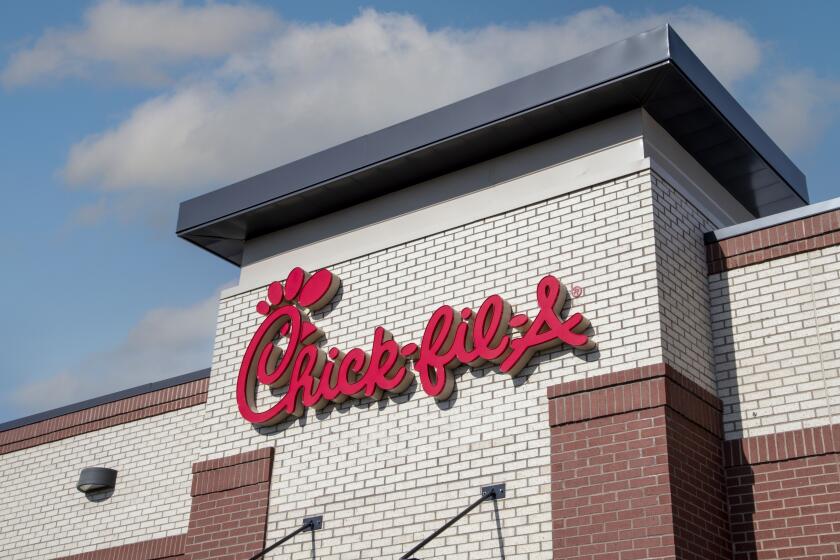Microsoft’s Plans for Windows Rattle the Computer Industry : Technology: Some say the software giant is using its muscle to force a swift change to its new operating system.
SEATTLE — When Microsoft Corp. shifts gears, the vibrations are felt in every corner of the computer universe, from Silicon Valley to Tokyo to New York.
That’s what is happening now. The software giant on Thursday set in motion a sweeping plan to move about 60 million users of its Windows software to a new, easier-to-use personal computer operating system called Windows 95.
“This may be one of the most important releases ever done in the PC industry,” said Paul Maritz, senior vice president of Microsoft’s systems division. “We could easily have 30 million copies go out in the first year.”
If Microsoft succeeds with its new product, just about everyone who uses a personal computer that isn’t an Apple Macintosh will eventually be a customer--and just about every software company in the world will be forced to adapt to a new, Microsoft-defined universe.
If Windows 95 doesn’t live up to its billing as a slick, easy-to use program, however, it could create major headaches for users and software developers, and sully Microsoft’s reputation. It might also open the way for competitors--notably IBM Corp., which is readying a surprisingly potent upgrade of its much-maligned OS/2 PC operating system.
Already, Microsoft has had plenty of problems with its new product, which was code-named Chicago and officially renamed Windows 95 on Thursday. Originally scheduled for release at the end of 1993, Windows 95 now won’t be available until as late as May of 1995--and many potential customers won’t be using it until 1996.
Some analysts also say the software will require far more power and memory than most people now have on their computers. “The road to Chicago will prove to be a long and rocky one,” said Will Zachmann, president of Canopus Research in Duxbury, Mass.
But Microsoft on Thursday assured reporters that Windows 95 would be so much easier to use it would help tap a massive new market for home computer users around the globe--including as many as 50 million Chinese households now wealthy enough to buy personal computers.
Many applications can be started with a single click, and the software is designed to automatically adjust to different brands of hardware, making setup easier, said Brad Chase, a general manager for personal operating systems at Microsoft.
“Our goal is to make it as easy to use as toasting a bagel,” he said. When pressed, Chase admitted the new software wouldn’t be quite as easy as pressing the lever on a toaster. “It won’t be nirvana, but we’ll take you a long way toward the promised land,” he said.
Such statements from Microsoft have set high expectations that could easily be disappointed. Many industry insiders and competitors, for starters, are unimpressed.
“It’s 10-year-old technology,” said Don Norman, a senior Apple Computer researcher who says Windows 95 is where Macintosh was when it first came out.
“Chicago is the best thing that ever happened to us,” added Wally Casey, director of marketing for IBM’s personal software products division. Casey said customers and software vendors have already begun to regard IBM’s new version of OS/2, dubbed “Warp,” as a better product and an easier upgrade path than Windows 95.
But Microsoft’s enormous marketing muscle virtually guarantees that it will sell tens of millions of copies of Windows 95. And the software companies that write applications programs for PCs are loath to bet against Microsoft. Firms such as Lotus lost sales because they didn’t write software for Windows when it first came out, and they won’t make the same mistake again.
“Every major vendor has learned their lesson. They will all have Chicago versions out as fast as humanly possible,” said Jeff Tarter, publisher of Softletter, a Watertown, Mass. industry newsletter.
Microsoft is speeding the transition to the new products by disparaging its existing Windows product as difficult to use and obsolete. To further accelerate the switch over, the company is requiring that software take advantage of key features of Windows 95 and be compatible with another Microsoft operating system, Windows NT, before it is allowed to use the Windows logo.
That tactic has angered some software vendors, who say Microsoft is using its market power to prop up the failed Windows NT software and to push users into the Windows 95 world. But Microsoft, which recently agreed to change some of its licensing practices to avert a government antitrust lawsuit, is now feeling free to use its enormous clout.
The Windows 95 launch will be accompanied by the biggest advertising campaign in the company’s history. And Microsoft demonstrated its sway over the industry by including rival Novell Inc., as well as Hewlett-Packard Co. and Sony Corp., in its announcement Thursday.
“This product will have a profound impact in the computer world,” said Patty Kim, a Sony marketing manager who claimed the new Windows product would make it easier to use PCs that incorporate Sony’s CD-ROM drives.
Still, Microsoft won’t rely on its market power alone to get it through the transition. The company, which has become famous for releasing first versions of software that are full of bugs, says it wants to make sure this product is largely bug-free. The company will soon release hundreds of thousands of beta versions for tests to make sure there are no surprises.
Most testers are satisfied with the new software. Mark Eppley, chief executive of Travelling Software of Bothell, Wash., says the company has 10 engineers using Windows 95 on their systems, and they have reported no major problems. Eppley said the new Windows version also has features that make its substantially easier to develop software for.
But there are still glitches. One beta tester said his computer wouldn’t run the new software and he was forced to erase everything on his computer to remove the program. When he contacted Microsoft about the problem, he said, “They didn’t want to hear about it.”
By next fall, most new personal computers will be sold with Windows 95 already installed in them. But those sales replace existing Windows sales and won’t represent huge revenue gains. “The real gold mine is in upgrades,” says Brent Williams, an analyst at the Framingham-based consultant firm IDC Inc. “For Microsoft to get those sales, there has to be no surprises.”
More to Read
Inside the business of entertainment
The Wide Shot brings you news, analysis and insights on everything from streaming wars to production — and what it all means for the future.
You may occasionally receive promotional content from the Los Angeles Times.










